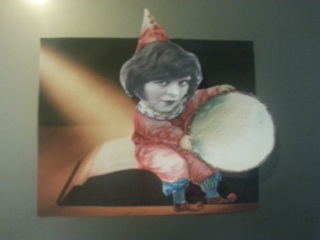The row is this unique space in which everything is lined up parallel to everything else. As much as the furniture is moved about, there is truly only one configuration, against the walls, out of the walkway. Even the wide rows are narrow. Very simply the floorplan is front door, stairwell to the second floor, dining room, kitchen: one room right behind another. Some people classify this as a straight-through because within a hundred footsteps you can walk straight through the entire house. There is no secret room. The exposure is apparent.
Now, the other thing that makes row houses rows is the walls. The walls are shared with the neighbors. On either side of the house, your neighbor is right on the other side of that wall. Half of the row homes I mentioned had one wall attached, instead of two, but the small alley between the house on the other offered little insulation from the neighbors. If the television in the neighbor's home butts up against the shared wall, it is quite possible to hear the program as if your tuner was dialed into the same station. The conversations are overheard without straining to eavesdrop. The fighting shakes the walls. Laughter travels through the buffers. Regardless of the age of the home or the thickness of the walls, there is an intimacy shared with the row.
None of this information is insightful. It is merely stated to create a foundation of my intention on this site. I have written stories as long as I can remember. When I was nineteen I completed a manuscript. The characters were colorful. The story was trite. The resolution was obvious. I was inexperienced and insecure and did not see that tale to fruition. That story is in the garbage. But, writing that story was a daunting task. It was the first big project I committed to write. Prior to that, I had written poems, essays, articles and a few short panels of comic strips – there was nothing over 5,000 words. The internet did not exist. Any research I did involved leaving my house to comb through a card catalog, writing down Dewey Decimal call numbers to find in the stacks physical books in which I had to decipher table of contents, thumb though pages that smelled like almond and pine and sink into a hard wooden chair very publicly to do something very private. I would complain about not having an electric typewriter when my fingers hurt slamming down on the keys of our depression-era Underwood typewriter that was rescued from my grandmother's basement. And when I saved up funds to buy an electric typewriter, I complained then about not having a high-tech word processor that had five lines of reviewable text and a memory that probably would have burped with indigestion before ingesting the amount of words I was typing each day. But in this time, I was told the simplest thing. “What's wrong with a pen and paper?” At the time I remember tensing up with irritation that my wants were not being heard – in other words my complaint was not being tolerated. But, twenty years later, it occurs to me, whatever the intention of that friend casting a hush to my whine, the machine is a tool. The words are within me. And it's been far too long that they have kept only me company.
In the past year, I have completed a manuscript I started two row houses ago, wrote a complete speculative fiction manuscript and just yesterday put to bed my first draft of a kooky story that I feel is my best yet.
I'm ready for the exposure of someone sharing my words. I'm ready for the world to be my neighbor in this row.



 RSS Feed
RSS Feed
